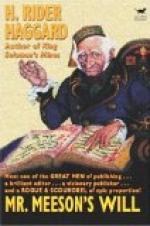About a week after Augusta’s adventure in Regent-street, a motion was made in the Court of Probate on behalf of the defendants, Messrs. Addison and Roscoe, who were the executors and principal beneficiaries under the former will of November, 1885, demanding that the Court should order the plaintiff to file a further and better affidavit of scripts, with the original will got up by him attached, the object, of course, being to compel an inspection of the document. This motion, which first brought the whole case under the notice of the public, was strenuously resisted by Mr. James Short, and resulted in the matter being referred to the learned Registrar for his report. On the next motion day this report was presented, and, on its appearing from it that the photography had taken place in his presence and accurately represented the tattoo marks on the lady’s shoulders, the Court declined to harass the “will” by ordering her to submit to any further inspection before the trial. It was on this occasion that it transpired that the will was engaged to be married to the plaintiff, a fact at which the Court metaphorically opened its eyes. After this the defendants obtained leave to amend their answer to the plaintiffs statement of claim. At first they had only pleaded that the testator had not duly executed the alleged will in accordance with the provisions of 1 Vic., cap. 26, sec. 2, and that he did not know and approve the contents thereof. But now they added a plea to the effect that the said alleged will was obtained by the undue influence of Augusta Smithers, or, as one of the learned counsel for the defendants put it much more clearly at the trial, “that the will had herself procured the will, by an undue projection of her own will upon the unwilling mind of the testator.”




